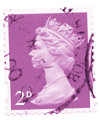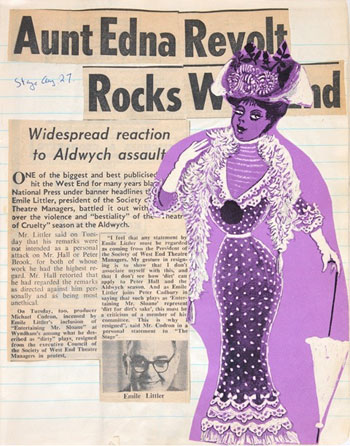
ABOUT
Edna Welthorpe
Orton was not just a playwright but also a prankster and a provocateur.
Between 1959 and 1962, he and his partner Kenneth Halliwell expressed their disdain for mainstream society by playfully redesigning the covers of books stolen from Hampstead and Islington public libraries. After returning the books, the couple would amuse themselves by watching the shocked reaction of unsuspecting readers to the ‘absurd or mildly obscene’ artwork that they pasted onto dustjackets.
Orton and Halliwell’s ‘defaced’ library book covers are owned by Islington Local History Centre and Museum.
Around the same time that he and Halliwell started redesigning library books, Orton also began writing prank letters using false names. Orton adopted various pseudonyms including Donald H. Hartley, Peter Pinnell, John A. Carlsen and Jay Chakiris but the name he employed most often was Mrs Edna Welthorpe.
This name was inspired by ‘Aunt Edna’ the title that fellow playwright Terence Rattigan gave to the typical 1950s theatre-goer. Aunt Edna was white, middle-class and conservative. Orton’s first stage play Entertaining Mr Sloane was fiercely attacked by ‘Aunt Edna’. Condemned as brutal, sick and disgusting, Sloane became the centre of a protest about ‘dirty’ plays in London’s West End, the heart of Theatreland. Orton cut out and kept a 1964 article about the scandal titled ‘Aunt Edna Revolt Rocks West End’.
Edna’s surname conveys her status as a do-gooder and her sense of righteousness (‘well’ means ‘good’). It also conveys her strong allegiance to English tradition and her limited horizons (‘thorpe’ is the Anglo-Saxon word for ‘village’).

Letter from Oscar enclosing a copy of a letter written to him by some irate man (or woman) who’d been to see Loot. The letter said we should advertise the play as ‘immoral.’ Intend to write an Edna Welthorpe letter to them expressing my complete agreement with their disgust”
The Orton Diaries, 15 April, 1967
ABOUT
Edna Welthorpe
Orton was not just a playwright but also a prankster and a provocateur.
Between 1959 and 1962, he and his partner Kenneth Halliwell expressed their disdain for mainstream society by playfully redesigning the covers of books stolen from Hampstead and Islington public libraries. After returning the books, the couple would amuse themselves by watching the shocked reaction of unsuspecting readers to the ‘absurd or mildly obscene’ artwork that they pasted onto dustjackets.
Orton and Halliwell’s ‘defaced’ library book covers are owned by Islington Local History Centre and Museum.
Around the same time that he and Halliwell started redesigning library books, Orton also began writing prank letters using false names. Orton adopted various pseudonyms including Donald H. Hartley, Peter Pinnell, John A. Carlsen and Jay Chakiris but the name he employed most often was Mrs Edna Welthorpe.
This name was inspired by ‘Aunt Edna’ the title that fellow playwright Terence Rattigan gave to the typical 1950s theatre-goer. Aunt Edna was white, middle-class and conservative. Orton’s first stage play Entertaining Mr Sloane was fiercely attacked by ‘Aunt Edna’. Condemned as brutal, sick and disgusting, Sloane became the centre of a protest about ‘dirty’ plays in London’s West End, the heart of Theatreland. Orton cut out and kept a 1964 article about the scandal titled ‘Aunt Edna Revolt Rocks West End’.
Edna’s surname conveys her status as a do-gooder and her sense of righteousness (‘well’ means ‘good’). It also conveys her strong allegiance to English tradition and her limited horizons (‘thorpe’ is the Anglo-Saxon word for ‘village’).

Image reproduced with kind permission of the Orton Estate and University of Leicester.

Letter from Oscar enclosing a copy of a letter written to him by some irate man (or woman) who’d been to see Loot. The letter said we should advertise the play as ‘immoral.’ Intend to write an Edna Welthorpe letter to them expressing my complete agreement with their disgust”
The Orton Diaries, 15 April, 1967
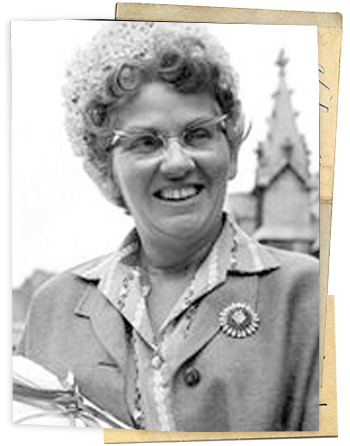
MARY WHITEHOUSE
Orton’s fictional Edna Welthorpe resembles the real-life Mary Whitehouse (1910-2001), the self-styled moral crusader who complained about indecency, declining moral standards and ‘dirty’ television programmes.
Mary Whitehouse upheld traditional Christian beliefs and opposed the new ‘permissive society’. Working with Norah Buckland, a Staffordshire vicar’s wife, Mary Whitehouse launched a Clean Up TV Campaign in 1964. The manifesto stated:
1. We WOMEN OF BRITAIN believe in a Christian way of life.
2. We want it for the children we bear and the country we love.
3. We deplore present-day attempts to belittle or destroy it, and in particular we object to the propaganda of disbelief, doubt and dirt that the BBC pours into millions of homes.
4. Crime, violence, illegitimacy and venereal disease are steadily increasing, yet the BBC employs people whose ideas and advice pander to the lowest in human nature and accompany this with a stream of plays which present promiscuity, infidelity and drinking as normal and inevitable.
5. We call upon the BBC for a radical change of policy and demand programmes which build character instead of destroying it.
Orton’s fictional Edna Welthorpe resembles the real-life Mary Whitehouse (1910-2001), the self-styled moral crusader who complained about indecency, declining moral standards and ‘dirty’ television programmes.
Mary Whitehouse upheld traditional Christian beliefs and opposed the new ‘permissive society’. Working with Norah Buckland, a Staffordshire vicar’s wife, Mary Whitehouse launched a Clean Up TV Campaign in 1964. The manifesto stated:
1. We WOMEN OF BRITAIN believe in a Christian way of life.
2. We want it for the children we bear and the country we love.
3. We deplore present-day attempts to belittle or destroy it, and in particular we object to the propaganda of disbelief, doubt and dirt that the BBC pours into millions of homes.
4. Crime, violence, illegitimacy and venereal disease are steadily increasing, yet the BBC employs people whose ideas and advice pander to the lowest in human nature and accompany this with a stream of plays which present promiscuity, infidelity and drinking as normal and inevitable.
5. We call upon the BBC for a radical change of policy and demand programmes which build character instead of destroying it.

MARY WHITEHOUSE
A letter from Mary Whitehouse,
dated 13 December, 1968:
Dear Lord Aylestone,
A number of people have spoken to me about the behaviour of Mick Jagger on Frost On Saturday… They were affronted, not only by the obscenity of his actions – I am told that he used his microphone as a phallic symbol – but also by the references to Jesus Christ in a song in such a setting…
Since the – perhaps too simple – explanation for Mick Jagger’s behaviour is that he is an exhibitionist, could not the matter best be settled by him not being invited to appear again…
Ben Thompson ed. Ban This Filth! Letters from the Mary Whitehouse Archive (Faber, 2001)
Orton’s Edna Welthorpe anticipates the emergence of Mary Whitehouse, who sent her first letter of complaint to the BBC in 1963.
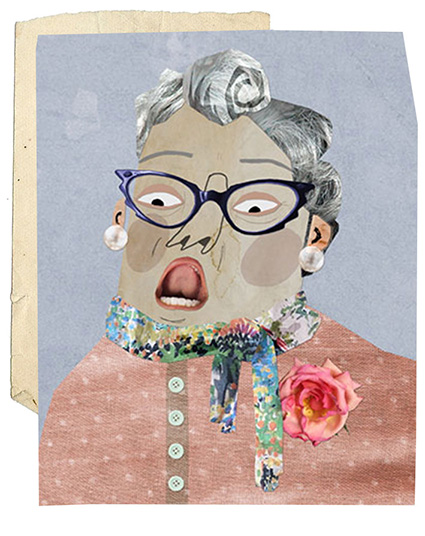
A letter from Mary Whitehouse,
dated 13 December, 1968:
Dear Lord Aylestone,
A number of people have spoken to me about the behaviour of Mick Jagger on Frost On Saturday… They were affronted, not only by the obscenity of his actions – I am told that he used his microphone as a phallic symbol – but also by the references to Jesus Christ in a song in such a setting…
Since the – perhaps too simple – explanation for Mick Jagger’s behaviour is that he is an exhibitionist, could not the matter best be settled by him not being invited to appear again…
Ben Thompson ed. Ban This Filth! Letters from the Mary Whitehouse Archive (Faber, 2001)
Orton’s Edna Welthorpe anticipates the emergence of Mary Whitehouse, who sent her first letter of complaint to the BBC in 1963.

Edna’s Letters
Listen to Joe Orton’s sister, Leonie, reading some of the Edna letters by clicking here

Leonie Orton by Catherine Ashmore
Orton’s Edna Welthorpe letters satirise snobbery and conservatism.
Satire is defined as ‘the use of humour, irony, exaggeration, or ridicule to expose and criticize people’s stupidity or vices, particularly in the context of contemporary politics and other topical issues’ (English Oxford Living Dictionaries).
Edna typically writes admiring letters to institutions that represent high culture and social privilege (such as the Ritz Hotel) or indignant letters of complaint about aspects of working class culture that appal her (such as Littlewoods home shopping catalogue). She presents herself as the guardian of standards in relation to everything from tinned fruit to theatre.
Alternatively, Orton uses Edna to expose social prejudice. For example, Edna writers to the Reverend Sterry to ask if she can hire the church hall for the production of a play about homosexuality called ‘The Pansy’ knowing very well that he will say no.
Orton also employs Edna to exacerbate anxieties about declining standards in the theatre by having her write letters of complaint about his own plays.
The Edna letters exemplify the clever use of satire to deflate power and expose pretence and hypocrisy. Funny but never nasty, they offer an alternative to hate speech by illustrating how anger can be channelled into humour.
Orton’s Edna Welthorpe letters are published in
The Orton Diaries, ed. John Lahr (1986)
View an example of Edna’s letters by clicking here
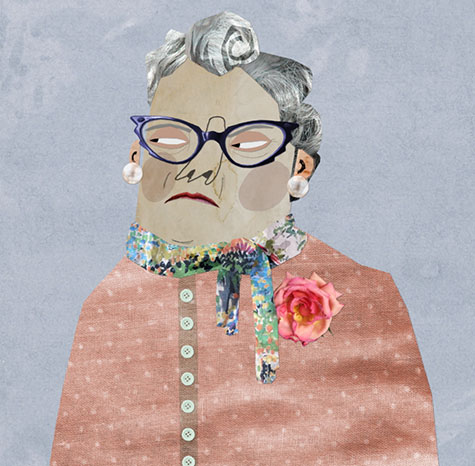
Edna’s Letters
Orton’s Edna Welthorpe letters satirise snobbery and conservatism.
Satire is defined as ‘the use of humour, irony, exaggeration, or ridicule to expose and criticize people’s stupidity or vices, particularly in the context of contemporary politics and other topical issues’ (English Oxford Living Dictionaries).
Edna typically writes admiring letters to institutions that represent high culture and social privilege (such as the Ritz Hotel) or indignant letters of complaint about aspects of working class culture that appal her (such as Littlewoods home shopping catalogue). She presents herself as the guardian of standards in relation to everything from tinned fruit to theatre.
Alternatively, Orton uses Edna to expose social prejudice. For example, Edna writers to the Reverend Sterry to ask if she can hire the church hall for the production of a play about homosexuality called ‘The Pansy’ knowing very well that he will say no.
Orton also employs Edna to exacerbate anxieties about declining standards in the theatre by having her write letters of complaint about his own plays.
The Edna letters exemplify the clever use of satire to deflate power and expose pretence and hypocrisy. Funny but never nasty, they offer an alternative to hate speech by illustrating how anger can be channelled into humour.
Orton’s Edna Welthorpe letters are published in
The Orton Diaries, ed. John Lahr (1986)
Listen to Joe Orton’s sister, Leonie, reading some of the Edna letters by clicking here

Leonie Orton by Catherine Ashmore
View an example of Edna’s letters by clicking here
Edna’s Legacy
Orton’s Edna Welthorpe letters have inspired other prank letters. See for example, William Donaldson’s The Henry Root Letters (1980) and Robin Cooper’s The Timewaster Letters (2005).


Edna’s Legacy
Orton’s Edna Welthorpe letters have inspired other prank letters. See for example, William Donaldson’s The Henry Root Letters (1980) and Robin Cooper’s The Timewaster Letters (2005).




